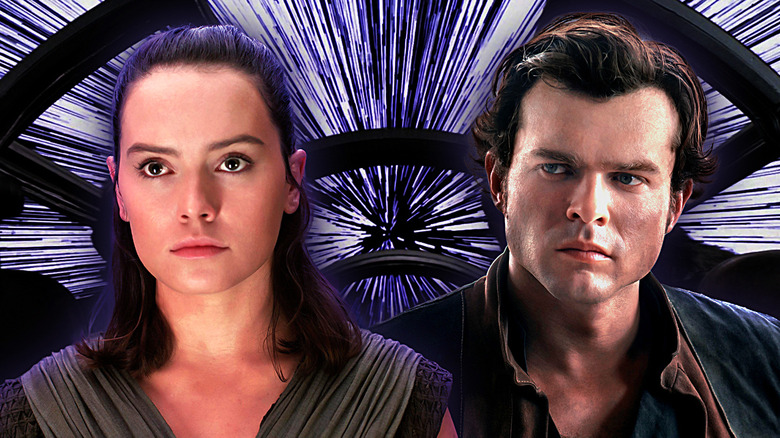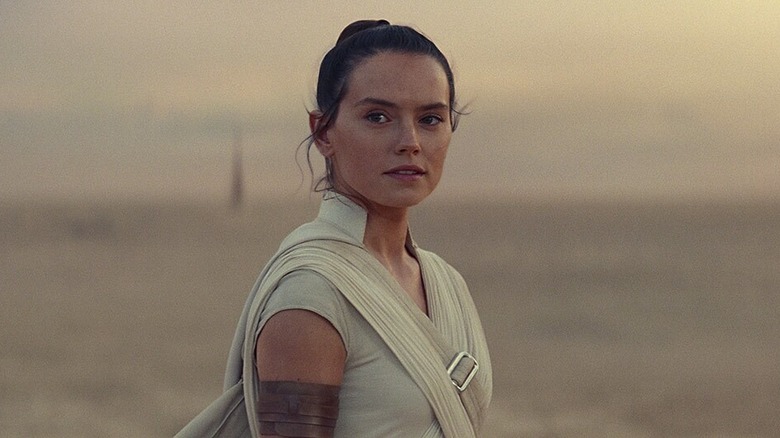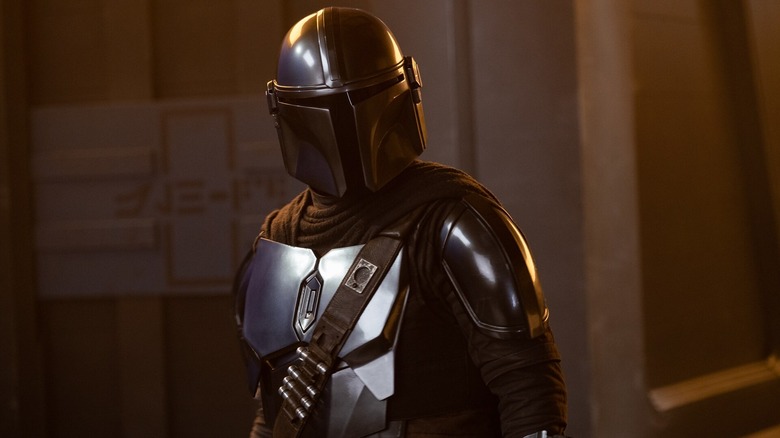Lucasfilm Is Avoiding A Big Mistake With Its New Star Wars Movies
We may receive a commission on purchases made from links.
It has been nearly five years since a "Star Wars" movie graced the silver screen. That movie was "Star Wars: Episode IX — The Rise of Skywalker" and it brought the sequel trilogy to a close on an uneven note. What just about everyone seems to agree on is that the second and third entries in that trilogy were divisive, leaving Lucasfilm on uncertain ground when it comes to the future of the franchise. The future is, slowly but surely, starting to come into focus, with several "Star Wars" feature projects currently in development. And while much remains mysterious, it does seem that Disney and Lucasfilm have learned at least one lesson from the recent past.
Previously, Disney had not one but two new "Star Wars" movies dated for 2026, which seemed like a mistake. We'll get into the why in a moment. One was set to arrive in May 2026, while another was due to arrive in December 2026. Fortunately, Disney recently announced that the December 2026 date has been handed over to "Ice Age 6," meaning that we're only going to get one movie set in a galaxy far, far away that year. That is the right move, as we've seen in the past that too much of a good thing, when it comes to this franchise, can be a bad thing.
In December 2017, director Rian Johnson's "Star Wars: Episode VIII — The Last Jedi" hit theaters. Riding high off of the wild success of " Star Wars: Episode VII — The Force Awakens" two years aerlier, Disney and Lucasfilm were feeling very confident. The film proved to be intensely polarizing, which seemed to catch the studio by surprise. "The Last Jedi" still made $1.33 billion globally, but "Star Wars" was unquestionably changed in its wake.
Because Disney and Lucasfilm were feeling confident, they also had "Solo: A Star Wars Story" arriving just a handful of months later in May 2018. The film suffered a tumultuous production and wound up costing a whopping $275 million after original directors Phil Lord and Chris Miller were replaced by Ron Howard mid-filming, with Howard proceeding to oversee a ton of reshoots. "Solo" ultimately bombed at the box office, making just $393.1 million worldwide (easily the lowest total for a live-action "Star Wars" movie to date).
Star Wars needs to focus on quality, not quantity
That double whammy of the "Last Jedi" controversy leading right into "Solo" disappointing at the box office represented a major turning point for Lucasfilm. Since then, a myriad of features have entered development, none of which have materialized, save for "Rise of Skywalker." Even in that case, Colin Trevorrow was replaced by J.J. Abrams as the film's director during pre-production. It all seemed more than a little bit messy.
Had Disney and Lucasfilm stuck to their previous release plan, they would've premiered two "Star Wars" movies seven months apart in 2026. That's a tad longer than the five month gap between "Last Jedi" and "Solo," but not enough for comfort. "Star Wars" shouldn't bite off more than it can confidently chew, now more than ever. Even the Marvel Cinematic Universe is decreasing its output. The emphasis has to be on quality, not quantity.
After what happened with "Solo" and the sequel trilogy, Lucasfilm can't afford another major misstep once "Star Wars" returns to the big screen. The studio seemingly has a slam dunk with "The Mandalorian and Grogu," which is taking that May 2026 slot. Beyond that, the future is far less certain, with a lot of ideas being thrown around and no clear direction emerging, at least not publicly.
We recently learned that Simon Kinberg is developing an entire new "Star Wars" trilogy, one that will reportedly pick up after the events of "Rise of Skywalker." That's just the tip of the iceberg. "The Clone Wars" maestro and Lucasfilm chief creative officer Dave Filoni is also developing a film that will, presumably, wrap up the storyline from "The Mandalorian" and its spinoffs. Elsewhere, James Mangold ("Logan") is working on a film set at the dawn of the Jedi thousands of years before the original trilogy, while Sharmeen Obaid-Chinoy ("Ms. Marvel") is slated to direct a film that will see Daisy Ridley return as Rey to form a new Jedi Order. That's not to mention the many other developing "Star Wars" films that are currently in the mix.
The pressure is on for Star Wars, there's no need to rush it
Given that projects such as Johnson's proposed trilogy and Kevin Feige's "Star Wars" movie never came to pass, it's hard to imagine that all of the above mentioned movies will actually see the light of day. What's clear is that Lucasfilm is still, five years later, struggling to find the best path forward for the franchise on the movie side. For that reason, it feels like a bad idea to suddenly have two films arriving within months of each other. Having at least a year between movies to A) ensure that audiences don't get burnt out and B) make sure nothing is being rushed feels like a no-brainer at this point.
In the meantime, a lot remains up in the air. Maybe the new plan looks like the old plan. Maybe we'll get Kinberg's trilogy. May those films will involve Rey and either combine with or replace Sharmeen Obaid-Chinoy's movie. And maybe on top of all that, we'll also get more standalone films like director Gareth Edwards' "Rogue One," which made more than $1 billion at the global box office and led to the much-beloved spin-off series "Andor" (which you can now grab on 4K or Blu-ray on Amazon since it's no longer strictly a Disney+ exclusive).
Either way, "The Mandalorian" has worked out pretty well on Disney+. Again, though, Filoni's movie seems to be winding that enterprise down. Because of that, it's more important than ever that Luasfilm successfully bring "Star Wars" back to its roots on the silver screen. That also means exercising patience and allowing people to get excited for "Star Wars" again. "The Force Awakens" benefited greatly from a 10-year break after "Star Wars: Episode III — Revenge of the Sith." Am I suggesting we need to wait nine years between "Star Wars" movies? No. But two movies per year seems like a fast track to burning out audiences and maximizing the odds of a catastrophic misfire.
"The Mandalorian and Grogu" is set to hit theaters on May 22, 2026.


